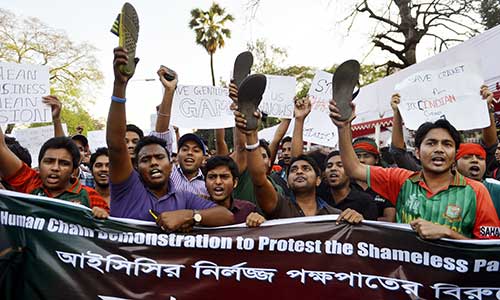When the entire cricketing world criticised the no-ball decision of umpires Aleem Dar and Ian Gould that costs Bangladesh the wicket of Rohit Sharma on 90, the game’s regulatory body, the International Cricket Council, said it was a 50-50 call.
‘The no-ball decision was a 50-50 call. The spirit of the game dictates that the umpire’s decision is final and must be respected,’ ICC chief executive officer David Richardson said in a statement on Friday.
ICC’s response came after Bangladesh reacted angrily to the no-ball decision to a legitimate Rubel Hossain delivery, which the country felt robbed them a chance of beating India in Thursday’s World Cup quarter-finals.
ICC president AHM Mustafa Kamal led the protest, saying that it looked like the umpires took the field after the result was pre-arranged. Kamal, who is also the planning minister of the Bangladesh government even threatened to quit his ICC position in protest.
‘As the ICC president, whatever I have to say I will say it in the next meeting. It could happen that maybe I will resign,’ Kamal said in comments aired on Bangladeshi television channels.
‘There was no quality in the umpiring. It looked like they took the field after it (the outcome) was pre-arranged,’ he alleged.
ICC chief executive Richardson was prompt to issue a statement defending Dar and Gould from all accusations of biased officiating.
‘Any suggestion that the match officials had ‘an agenda’ or did anything other than perform to the best of their ability are baseless and are refuted in the strongest possible terms,’ Richardson insisted.
Kamal, whose position has been largely ceremonial since India’s Narayanaswami Srinivasan became the body’s chairman last year, said the ICC’s acronym seemed to stand for the Indian Cricket Council.
‘I cannot represent the Indian Cricket Council. If someone has imposed a result on us, in that case no one can accept it,’ added Kamal.
Bangladesh Cricket Board president Nazmul Hasan also told the reporters in Melbourne that they will raise the issue in next ICC meeting. Bangladesh’s players, who were preparing to return home, also blasted the umpires for their biased decision.
‘It was robbery in broad daylight,’ said one fuming cricketer in Melbourne’s Langham Hotel, requesting the anonymity. The Tigers said they could barely sleep after being treated so harshly by the umpires with all the marginal decisions favouring India.
The juggling catch of Shikhar Dhawan, who seemed to touched the boundary rope with replay remaining inconclusive, the leg-before decision against Suresh Raina that Bangladesh unsuccessfully reviewed all had benefitted India team.
‘Against India we always know that we have to take wickets, otherwise it was going to be difficult,’ said Bangladesh skipper Mashrafee bin Murtaza after the game. ‘At that stage if Rohit got out, it would be great, but I think I can’t say anything in here. You all have seen what went on there.’
‘The no-ball decision was a 50-50 call. The spirit of the game dictates that the umpire’s decision is final and must be respected,’ ICC chief executive officer David Richardson said in a statement on Friday.
ICC’s response came after Bangladesh reacted angrily to the no-ball decision to a legitimate Rubel Hossain delivery, which the country felt robbed them a chance of beating India in Thursday’s World Cup quarter-finals.
ICC president AHM Mustafa Kamal led the protest, saying that it looked like the umpires took the field after the result was pre-arranged. Kamal, who is also the planning minister of the Bangladesh government even threatened to quit his ICC position in protest.
‘As the ICC president, whatever I have to say I will say it in the next meeting. It could happen that maybe I will resign,’ Kamal said in comments aired on Bangladeshi television channels.
‘There was no quality in the umpiring. It looked like they took the field after it (the outcome) was pre-arranged,’ he alleged.
ICC chief executive Richardson was prompt to issue a statement defending Dar and Gould from all accusations of biased officiating.
‘Any suggestion that the match officials had ‘an agenda’ or did anything other than perform to the best of their ability are baseless and are refuted in the strongest possible terms,’ Richardson insisted.
Kamal, whose position has been largely ceremonial since India’s Narayanaswami Srinivasan became the body’s chairman last year, said the ICC’s acronym seemed to stand for the Indian Cricket Council.
‘I cannot represent the Indian Cricket Council. If someone has imposed a result on us, in that case no one can accept it,’ added Kamal.
Bangladesh Cricket Board president Nazmul Hasan also told the reporters in Melbourne that they will raise the issue in next ICC meeting. Bangladesh’s players, who were preparing to return home, also blasted the umpires for their biased decision.
‘It was robbery in broad daylight,’ said one fuming cricketer in Melbourne’s Langham Hotel, requesting the anonymity. The Tigers said they could barely sleep after being treated so harshly by the umpires with all the marginal decisions favouring India.
The juggling catch of Shikhar Dhawan, who seemed to touched the boundary rope with replay remaining inconclusive, the leg-before decision against Suresh Raina that Bangladesh unsuccessfully reviewed all had benefitted India team.
‘Against India we always know that we have to take wickets, otherwise it was going to be difficult,’ said Bangladesh skipper Mashrafee bin Murtaza after the game. ‘At that stage if Rohit got out, it would be great, but I think I can’t say anything in here. You all have seen what went on there.’
Source: New Age










